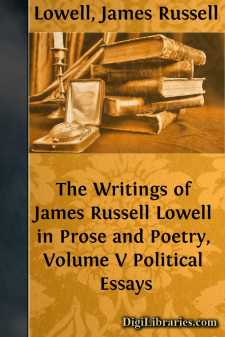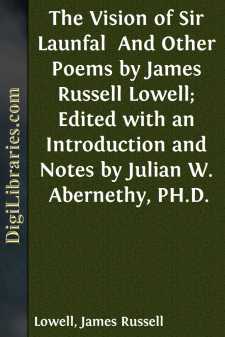Categories
- Antiques & Collectibles 13
- Architecture 36
- Art 48
- Bibles 22
- Biography & Autobiography 813
- Body, Mind & Spirit 142
- Business & Economics 28
- Children's Books 17
- Children's Fiction 14
- Computers 4
- Cooking 94
- Crafts & Hobbies 4
- Drama 346
- Education 46
- Family & Relationships 57
- Fiction 11829
- Games 19
- Gardening 17
- Health & Fitness 34
- History 1377
- House & Home 1
- Humor 147
- Juvenile Fiction 1873
- Juvenile Nonfiction 202
- Language Arts & Disciplines 88
- Law 16
- Literary Collections 686
- Literary Criticism 179
- Mathematics 13
- Medical 41
- Music 40
- Nature 179
- Non-Classifiable 1768
- Performing Arts 7
- Periodicals 1453
- Philosophy 64
- Photography 2
- Poetry 896
- Political Science 203
- Psychology 42
- Reference 154
- Religion 513
- Science 126
- Self-Help 84
- Social Science 81
- Sports & Recreation 34
- Study Aids 3
- Technology & Engineering 59
- Transportation 23
- Travel 463
- True Crime 29
The Writings of James Russell Lowell in Prose and Poetry, Volume V Political Essays
Categories:
Description:
Excerpt
1858
There was no apologue more popular in the Middle Ages than that of the hermit, who, musing on the wickedness and tyranny of those whom the inscrutable wisdom of Providence had intrusted with the government of the world, fell asleep, and awoke to find himself the very monarch whose abject life and capricious violence had furnished the subject of his moralizing. Endowed with irresponsible power, tempted by passions whose existence in himself he had never suspected, and betrayed by the political necessities of his position, he became gradually guilty of all the crimes and the luxury which had seemed so hideous to him in his hermitage over a dish of water-cresses.
The American Tract Society from small beginnings has risen to be the dispenser of a yearly revenue of nearly half a million. It has become a great establishment, with a traditional policy, with the distrust of change and the dislike of disturbing questions (especially of such as would lessen its revenues) natural to great establishments. It had been poor and weak; it has become rich and powerful. The hermit has become king.
If the pious men who founded the American Tract Society had been told that within forty years they would be watchful of their publications, lest, by inadvertence, anything disrespectful might be spoken of the African Slave-trade,—that they would consider it an ample equivalent for compulsory dumbness on the vices of Slavery, that their colporteurs could awaken the minds of Southern brethren to the horrors of St. Bartholomew,—that they would hold their peace about the body of Cuffee dancing to the music of the cart-whip, provided only they could save the soul of Sambo alive by presenting him a pamphlet, which he could not read, on the depravity of the double shuffle,—that they would consent to be fellow members in the Tract Society with him who sold their fellow members in Christ on the auction block, if he agreed with them in condemning Transubstantiation (and it would not be difficult for a gentleman who ignored the real presence of God in his brother man to deny it in the sacramental wafer),—if those excellent men had been told this, they would have shrunk in horror, and exclaimed, "Are thy servants dogs, that they should do these things?"
Yet this is precisely the present position of the Society.
There are two ways of evading the responsibility of such inconsistency. The first is by an appeal to the Society's Constitution, and by claiming to interpret it strictly in accordance with the rules of law as applied to contracts, whether between individuals or States. The second is by denying that Slavery is opposed to the genius of Christianity, and that any moral wrongs are the necessary results of it. We will not be so unjust to the Society as to suppose that any of its members would rely on this latter plea, and shall therefore confine ourselves to a brief consideration of the other.
In order that the same rules of interpretation should be considered applicable to the Constitution of the Society and to that of the United States, we must attribute to the former a solemnity and importance which involve a palpable absurdity....







